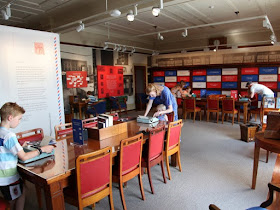The manual
portable typewriters at the “Yours Faithfully” exhibition at the Museum of
Australian Democracy (Old Parliament House) in Canberra have been getting a ton of use. I
was over there again this week to do some more running repairs on a couple of
the machines. It’s been interesting for me to see that the machine which has
stood up best to constant use (and dare I say abuse) is the Hermes Baby. It hasn’t missed
a beat in six weeks. Next best performer has been the Nakajima Imperial 200.
The curators tell me that over the Christmas-New Year holiday period
people were “queuing up to use the typewriters”. The evidence that this is true is certainly
there. Every time I visit to check on the machines there are groups of children
tapping merrily away – and not always that well supervised. With Canberra blanketed in thick bushfire smoke and temperatures consistently up around the 100 degrees mark, families have looked for somewhere to escape the oppressive conditions, and have found not just the air-conditioned comfort of MoAD, but the joy of typewriters to boot. Cool fun encapsulated in a room full of typewriters!
Plenty of adults
have availed of the opportunity to type, too, and I have been told of at least two
young males who have decided to acquire their own typewriters, so enamored were
they by the experience at MoAD - indeed, one of them wants to start his own
collection. Up to 70 typewritten letters a day are being collected from the
mail box. The school holidays end next week and the pressure on these machines
might be eased a little – at least temporarily.
Kids love the challenge of using a typewriter, but the typewriter doesn’t
always appreciate the way they treat it. The most common problem for me to fix
relates to the ribbons, and it seems kids can’t resist the temptation to grab at
the ribbons and pull them out. It’s not just about the magic of seeing the
letters you type appear instantly on a page in front of you, but about how that’s
achieved – a computer printer, by comparison, is just a dull plastic box. Little
black fingerprints all over most of the machines bear testimony to the habit of
checking out ribbons.
The worst thing that has happened so far is that someone
decided to try to souvenir some of the keytops off an Olivetti Lettera 32 – not
all that easy a thing to do - and in the case of “E”, succeeded. I’ve also fixed the carriage lever on the
Adler Contessa, the spacebar on the Facit TP1, a snapped drawband on the Silver-Reed
100 and some sticky keys on machines on which, seemingly, a child has decided
to press all the keys at once (not an uncommon occurrence in my experience).
All in all, however, “Yours Faithfully” has already been declared an unqualified
success and is one of the most popular exhibitions at MoAD.
Another MoAD exhibition which includes a typewriter (a Remington Model 2
portable) is called “Truth, Power and a Free Press”. Next to it is the
collection of the previous year’s outstanding newspaper political cartoons,
which also embraces references to a free press. “FW”, who tried to leave a
comment on my blog last June about Australian Press freedoms – interesting coming
from someone living in a country presided over by Donald Thump – might be
interested to see these (except he refuses to read my blog any longer).
The above chart shows how far ahead of the United States Australia is in relation to press freedoms. But New Zealand is also away ahead of Australia.
Anyway,
not far away from MoAD is the National Library, where there is an exhibition
about the writing of children’s literature - with yet another typewriter, in
this case a Corona 4.


















It's refreshing to read some good news from Australia!
ReplyDeleteGood to hear the typewriter display is a success.
ReplyDelete